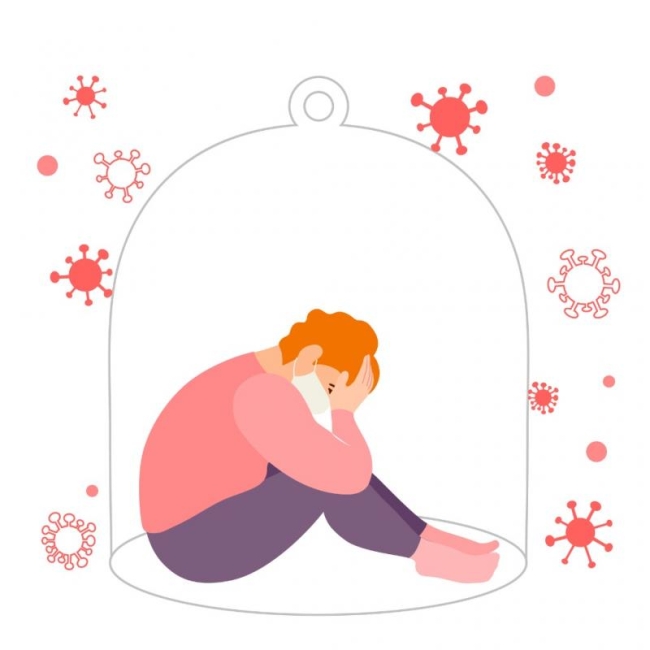You have /5 articles left.
Sign up for a free account or log in.

istock.com/arastaslia kurman
While I never met Dee, I will never forget her.
A decade ago, I was spending my second summer of undergraduate living in a Midwestern city as part of a summer research internship. The goal was to try my hand at laboratory research and to discern my career path -- whether as a research scientist or a physician.
While I was out for an evening run, about a block away from a rail crossing, sirens and lights indicated through the dusk that a train was approaching. As the engine neared, I spotted Dee across the tracks; a slender, middle-aged woman plodding up the sidewalk toward the descended arms. As she sidestepped the metal blocking her path, I could only watch as she proceeded forward to go nose to nose with the cattle guard and was dragged to the ties.
The tracks in these towns are raised above the road on either side, so I watched her tumble and turn along the tracks for 20 yards or so before she disappeared. Turning in desperation, I sprinted to a car with two young women, frozen with their mouths agape, who wordlessly handed me a cellphone. After the call, I ran over to where I had last seen Dee, hoping to use my CPR training to support her until help arrived. By now it was difficult to see, and it was after a frantic minute of searching that I came the closest I ever would to meeting her -- five yards was near enough to conclude that nothing could be done.
The rest of the situation was a bit of a blur of sirens, lights and eerily matter-of-fact conversation. For what felt like forever, I stood under a peach-colored streetlight, splattering sweat as I slapped at mosquitoes or whatever it was gnawing at my back, telling an officer what had happened. After I had given my statement, I jogged sullenly into the night toward home, discerning by the step.
Growing up, I had neither education nor much experience with issues of mental health -- or, at the very least, I was conditioned by the culture of my small town to think that such issues were symptomologies of shortcomings of character. But the abrupt realization of my naivety toward issues of mental health led to a transformed worldview -- not only in searching for some sense of why Dee would have done what she did, but also why I knew nothing of how to frame any answer.
The revelations did not truly become manifest until I entered graduate school, deflected from medical aspirations by the helplessness of that summer night. There, the perfect storm coalesced to effect rumblings of mental ill-being. In graduate school, students are expected to transition from simply acquiring knowledge to generating it, and they are faced with constant reminders of how little they know as well as frequent failure. As one might surmise, this environment can often lend itself to mental health struggles.
My own mental health was most negatively impacted during my third year in graduate school, at the time of qualification exams. That is the point in the Ph.D. pursuit that you either sink or swim -- prove your worth and show that you belong, or leave. (We do this type of thing to one another a lot in academe.) Where this pressure originates -- along a spectrum from entirely self-imposed to a prerogative of the program’s culture -- varies widely.
In my own experience, the feelings of inadequacy and severe anxiety during the qualification period were unrivaled by any other points in my life. In the months before my exam, I found myself working 100-plus-hour weeks, napping among biological waste bins, experiencing extended isolation and becoming frenzied by delusions of diminished self-worth and ability. The diminishment of my sense of self was exacerbated further by other people’s questions about my dedication to the work, gaslighting and the like that so many graduate students experience, particularly women and minorities. While I questioned the merit of leaving many times during my graduate school career, this was the only period when I questioned the merit of staying.
I persisted in defending my dissertation, and while I was physically alone in those qualification moments -- and perhaps felt even more alone than that -- I was not unique. According to Nature, 36 percent of early-career researchers surveyed sought help during graduate school for anxiety and/or depression related to their studies. Similarly, survey data from the American College Health Association reveals that 52 percent of graduate and 48 percent of undergraduate students have sought these services at some point in their lives.
Based on data from the Healthy Minds Network, however, it appears that even more students are not seeking or obtaining these services. (I’m an example.) The reasons students did not seek out care included that they perceived stigma against mental illness, felt that campus services weren’t always accessible and/or useful, and that they’d have to confront myriad barriers to accessing help and support.
I should add that it does not escape me that the stipend at my university, the resultant security of food and shelter, and my demographic were some of the privileges afforded me that are not available to everyone who struggles with mental health. They were luxuries that Dee may not have had -- that many students do not have.
An Exacerbation of the Old Normal
Now, years after Dee and grad school, I have transitioned to an advising role. And I find myself spending a growing amount of my time helping students to acquire all or some of those kinds of privileges -- or to better cope with a dearth of them.
Academics are not trained to counsel students with mental illness, however, and I often find myself learning counseling skills in real time across a desk from students in varying depths of depression, anxiety and levels of acceptance of those struggles. For academic advisers, this is, at least in part, because college counseling centers are chronically overwhelmed. According to survey data from the Association for University and College Counseling Center Directors, 57 percent report they don’t have enough hours to meet student needs, that first appointment wait times average 6.5 days and that students not in acute crisis are put on waiting lists with average wait times of 17.7 days.
While institutions (including mine) are working to meet those challenges -- 43 percent of counseling centers added staff in the past year -- the need still outpaces the response. And academic advisers are often shouldering the overload because many of these students in need do not have the privilege of waiting in line.
And now throw in the wrench of SARS-CoV-2 and COVID-19. From afar, my colleagues and I have been working to adapt to these pandemic predicaments to better orient our services in ways that intersect understanding, accommodation and upholding the pillars of the academe in circumstances for which they were ill constructed. Like many other people on our campuses, we’ve been faced with a lack of direction, a destabilized mentality and a yearning for structure brought on by our own displacement from our normal workplaces and regimens.
While this is a new experience for a number of my colleagues, I am instead reminded of graduate school, where I and many other students spent years dealing with symptoms eerily similar to those that the masses have contracted during this pandemic. But in graduate school, struggles of to develop physical and psychological security, adapting one’s mental state to the rigors of the work, and new-normal establishment are cyclical rather than foundational -- the impostor syndrome, failed experiments, financial struggles and consistent isolation are ever-present in ways that require these steps to be taken with regularity. For graduate students, this is an exacerbation of the old normal.
Not only are our students now more anxious, but they are dislocated. Many do not have access to the technology necessary to continue study, are separated from their typical support systems, are taking care of sick family members or friends, are ill themselves, have returned to difficult homes or have nowhere to go. Such factors are amplifying previously existing struggles with mental health care, particularly for those with social and economic vulnerabilities. According to recent survey data from the Healthy Minds Network, 60 percent of students report increased difficulty in accessing mental health care during the pandemic, and 66 percent have experienced increased financial stress. Universities have much work to do to address the heightened and pervasive sense of anxiety, isolation and helplessness in our student population.
Advising Strategies
I’ve seen many articles written about protecting my own mental health as an adviser and supporting students generally during this pandemic, but not many on advising strategies that promote student mental well-being in a virtual learning environment. Based on ideas from conversations with colleagues, I am taking a few steps this semester that may help me serve all my students better:
Getting personal. The personal relationship, vitally important to advising, is even more necessary now because students are in such need of genuine interactions. I’m making it a point to send my students updates about my own life this semester, as well as holding regular drop-in sessions where the agenda is wide-open and the room can fill more than my office ever could. My hope is that the feeling of knowing me just that much more lowers the barrier to approach me virtually. I’ll share recipes tried, projects completed, books read -- all in an attempt to build a better virtual mentorship.
Groundwork for networks. I want to facilitate community-building among students, too, because their normal opportunities for this type of interaction have been compromised. Piggybacking off my open meetings, I’ll encourage peer mentoring relationships, career networks and just plain friendships. The goal is to make regular introductions and catalyze exchanges between students that then grow organically, just as they usually would on campus.
Probing philosophies. Students are making tough decisions about their lives right now, particularly about their health and well-being. While I can, of course, give insights into the classes to take and timelines to graduation, I also plan to always raise queries about the ethos of their decision making and inject consideration of their well-being as critical to that process. What is it you’re trying to do in this class, and could you find that learning elsewhere in order to make more time to decompress each day? Will graduating a semester earlier really benefit you so much that it’s worth the mental stress you’re taking on? Questions like those are difficult to ask, but students need to hear them. And they need me to be willing to ask, because perhaps no one else will.
When I think of that night, now a decade ago, I harken back to Dee and how she sparked years of my own learning that I hope will help me to be the resource my students need during this pandemic. That memory has been an important reminder to me in these trying times that many people are feeling helpless and isolated, and such experiences tend to be incredibly formative.
I hope that the current circumstances will incite fervor toward meeting the ever-growing wave of mental health needs on campuses in this virtual state as well as for whenever we are all able to return, because social isolation has further steepened a curve that we were already behind. And while I worry for the mental and physical health of my students and peers during this crisis, I hope that they can provide, and accept from one another, support for the ability to persist.








